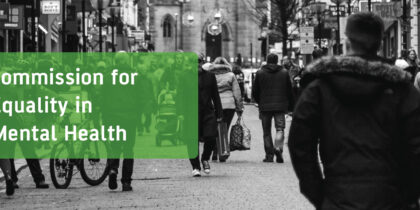By Andy Bell
It’s become a cliché to say this, but ‘we all have mental health’. All of us, throughout our lives, will experience a mixture of good and bad mental health; and most of us will experience mental ill health at some point in our lives, even if only briefly or occasionally. As a way of envisaging this, we often describe our mental health as being on a spectrum:
Every day of our lives, we are all somewhere on this spectrum. While everyone’s experiences are unique, and many people won’t fit neatly into the four headings used in the spectrum, they can be generalised as:
Healthy: enjoying mostly good mental health.
Coping: facing significant risks to mental health but not currently in difficulty. This may include people coping with loss or bereavement, financial difficulty, or relationship problems.
Struggling: dealing with major life challenges and at high risk of becoming unwell. This might include having experienced a major trauma or ongoing high levels of adversity.
Unwell: experiencing poor mental health, such as being given a diagnosis of mental illness that is currently causing significant distress and impairment. It is, however, possible for a person living with a mental health diagnosis to be at any point on the spectrum.
Our chances of having good or poor mental health are determined by the experiences in our lives. From the first spark of life, we’re all exposed to things that can either boost our mental health or put it at risk. The balance of those ‘risk and protective factors’ is what determines our chances of having good or poor mental health during our lives. During the pandemic, while everyone’s experience is different, for a great many people the last year’s events have added pressures and stresses that have put their mental health at greater risk.
It is likely that the after-effects of the pandemic will affect public mental health for up to five years, with the greatest long-term impacts likely to fall on those whose lives have been most affected – for example through trauma, grief and loss.
Despite the enormity of the challenge, there is growing evidence for a wide range of actions and interventions that can help people to enjoy the best mental health possible. While governments, local or national, cannot eradicate mental ill health, they can take effective steps to keep people who are healthy or coping towards the green end of the spectrum, and to enable those who are struggling or unwell to move in that direction. This is the essence of public mental health.
Government policies and strategies can help to improve mental health for all by taking effective action across the spectrum for people of all ages. This can include measures that have been proven to:
- Boost people’s chances of remaining ‘healthy’, such as social and emotional learning in schools, and policies that prevent poverty such as the Living Wage and the furlough scheme
- Support those who are ‘coping’ to prevent later difficulties, for example positive parenting programmes and inclusive education in schools
- Help people who are ‘struggling’, for example youth information, advice and counselling services and welfare advice for people dealing with problem debts
- Support people when they are ‘unwell’, for example through offering timely access to talking therapies and crisis services.
The pandemic is an unprecedented event in our lives. It has generated unprecedented responses to secure our physical health and safety. Now is the time to take unprecedented steps to protect and promote our mental health, too.
The Government’s mental health recovery action plan makes a start and, importantly, pledges to apply a mental health test for future policies. This could be a crucial step towards ‘building back better’ by designing policies across government, based on robust evidence, that seek to benefit the public’s mental health. For example, in education it could help schools and colleges to become more mental health friendly environments, and in business it could help forge workplace policies that support employee wellbeing and prevent people losing their jobs. In each case, the aim is to enable people to maintain their mental health as much as possible, and to support those who are struggling or unwell to cope.
Putting the public’s mental health at the heart of government will ultimately create a healthier, stronger and more compassionate society – and that is good for all of us.








